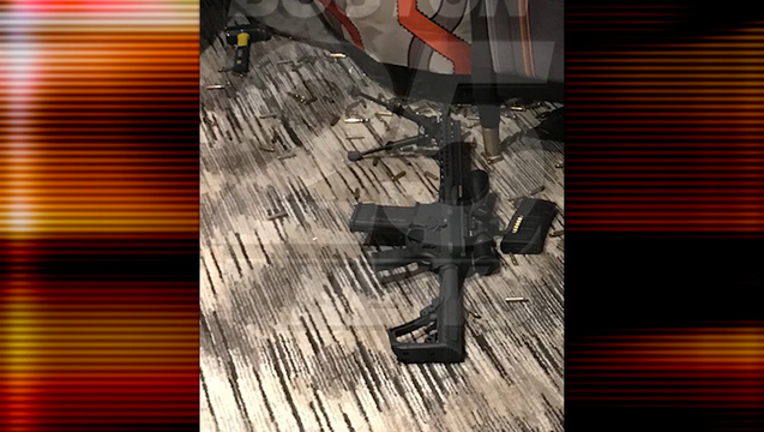Some in GOP open to banning gun accessory used in Vegas

WASHINGTON (AP) - Senior congressional Republicans say they are open to considering legislation banning "bump stocks" like the shooter in Las Vegas apparently used to make semi-automatic rifles perform more like fully automatic weapons.
The comments from lawmakers including the No. 2 Senate Republican, John Cornyn of Texas, marked a surprising departure from GOP lawmakers' general antipathy to gun regulations of any kind. But they were far from a guarantee of a path forward for the new legislation by Sen. Dianne Feinstein, D-Calif., especially with Majority Leader Mitch McConnell and House Speaker Paul Ryan making clear their priorities are elsewhere.
"If somebody can essentially convert a semi-automatic weapon by buying one of these and utilizing it and cause the kind of mayhem and mass casualties that we saw in Las Vegas, that's something of obvious concern that we ought to explore," Cornyn told reporters.
"I own a lot of guns and as a hunter and sportsman I think that's our right as Americans, but I don't understand the use of this bump stock and that's another reason to have a hearing."
Cornyn later said he'd spoken with Judiciary Committee Chairman Chuck Grassley, and that Grassley was interested in convening a hearing.
The devices, known as "bump stocks" among other names, are legal and originally were intended to help people with limited hand mobility fire a semi-automatic without the individual trigger pulls required. They can fit over the rear shoulder-stock assembly on a semi-automatic rifle and with applied pressure cause the weapon to fire continuously, increasing the rate from between 45 and 60 rounds per minute to between 400 and 800 rounds per minute, according to Feinstein's office.
The government gave its seal of approval to selling the devices in 2010 after concluding that they did not violate federal law.
Feinstein has a career-long history on the issue of guns after becoming mayor in San Francisco after her predecessor was gunned down. She authored an assault weapons ban that was in place for a decade before expiring in 2004, and said she had been considering trying to reintroduce that more sweeping legislation, as she's done unsuccessfully after past mass shootings, including the one at Sandy Hook elementary school in Connecticut. Senate Minority Leader Chuck Schumer urged her to go with a narrower bill that might be likelier to draw support.
Feinstein pleaded with the public to pressure Congress to consider her legislation after the horrific violence earlier this week when a gunman killed 58 people and injured hundreds at an outdoor concert that she said her own daughter had considered attending.
"Mr. and Mrs. America, you have to stand up, you have to say 'enough is enough,'" Feinstein said. "Why can't we keep a weapon from becoming a military-grade weapon?"
The National Rifle Association, which has played a major role in exerting political pressure against gun curbs, did not respond to inquiries about its stance on Feinstein's bill.
At least one Republican senator, Ron Johnson of Wisconsin, said outright he was prepared to vote to ban "bump stocks." ''I have no problem in banning those," he said.
Sen. John Thune of South Dakota, the No. 3 Republican senator, said, "I'm interested in finding out more about bump stocks and I've got my staff looking into that and I know there are other members interested in finding out more about it as well."
Even so, asked Tuesday about "bump stocks" and whether they should be legal, McConnell, R-Ky., said it was not an appropriate time to be discussing legislation.
Ryan, R-Wis., made similar comments Wednesday in a radio interview on WISN in Milwaukee.
"What I don't think you want your government to do is to lurch toward reactions before even having all the facts," Ryan said. "Bad people are going to do bad things."
In the House, meanwhile, Rep. David Cicilline, D-R.I., introduced a bill to ban the manufacture, possession, transfer, sale or importation of bump stocks. Rep. Dina Titus, D-Nev., whose district includes the site of Sunday night's rampage, said: "The victims and families in Las Vegas don't need an explanation about the difference between machine guns and firearms with bump stocks. They need action."
Congress' recent history gives little cause to think Republicans would take any action on guns. Even after the 2012 Sandy Hook shooting where schoolchildren were slaughtered, Feinstein's reintroduced assault weapons ban went nowhere, and bipartisan background check legislation by Democratic Sen. Joe Manchin of West Virginia and Republican Sen. Pat Toomey of Pennsylvania fell short on the Senate floor.
Last year, after the mass shooting at a dance club in Orlando, Florida, Democrats commandeered the House floor to protest GOP inaction on guns, but while garnering headlines the tactic did not yield results. Shooting incidents involving lawmakers themselves, like at a baseball practice earlier this year where Majority Whip Steve Scalise was critically injured, have not changed the calculus.
Feinstein held out hope that this time would be different because of the scale of casualties and the weaponry "taking it into war." And Manchin said that he planned to meet with Toomey on the background checks bill, but would not reintroduce it without significant GOP support, which he said "ain't going to happen unless the president gives his stamp of approval."
President Donald Trump visited Las Vegas on Wednesday but said "We're not going to talk about that today" when asked about gun issues.
___
Associated Press writer Matthew Daly contributed.

